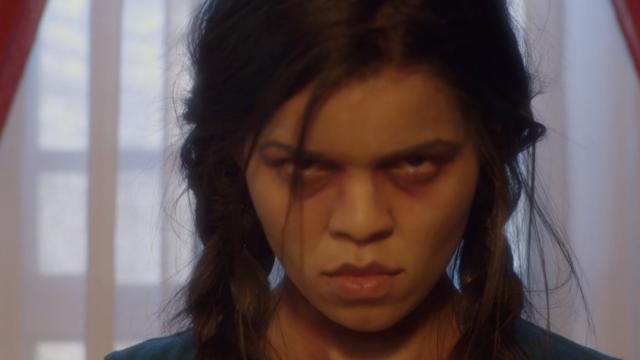Image: Vimeo
Blame, a short horror film from writer and director Kellee Terrell, is a harrowing meditation on sexual assault and its aftermath, using the supernatural to show how ignoring assault has real consequences.
Plotted in a manner that deliberately mimics real-life stories of assault like the Steubenville, Ohio rape case, Blame is about a young man (Javoun Baker) who participated in the group rape of a girl named Lala (Flavia Borges). Lala is dead, having committed suicide after the incident, and the only evidence of the assault exists as a video on this young man’s phone. His father (Jerod Haynes) is debating whether to give the evidence to the police or delete it — all while Lala’s ghost, and the guilt she represents, haunts him.
From where many of us are sitting, that may not seem like a very difficult choice at all, but it’s hard to get legal justice for sexual assault, and sometimes that’s because of family and community support for the accused. Right now, the family of a young woman who committed suicide after her reported rape is suing the University of Alabama for wrongful death. They say the university didn’t take her claims seriously, and the accused rapist avoided persecution because he came from an affluent family. And you don’t have to look any farther than the well-publicised case of Andrea Constand, whose case against Bill Cosby resulted in a hung jury despite dozens of women publicly accusing the actor of sexual assault.
However, Terrell is less interested in that final judgment than she is in lingering in community complicity in his crime. “I wanted to know who these people were who blame the victim, who protect the boys and sacrifice the girls, particularly in the African American community,” Terrell told Shadow and Act.
One of Blame’s biggest successes is how it enhances the the intensity of its subject material by making it a horror film. Lala becomes a ghost, quietly projecting judgment and asserting her own centrality even as her story gets lost within her abuser’s. The horror here plays as a challenge, a means to press the audience to recognise their own complicity in the denial of justice for victims of rape and to try and make sense of the justifications we give for covering over our community’s crimes.
By using the tropes of a horror film, Terrell also draws attention to the fraught legacy of sexual violence in the genre. While films like It Follows complicate the relationship between horror and sex, horror films have had a difficult time moving away from narrative patterns that shame and kill women for their sexuality, that treat the suffering of women either as sideshow or as distant, unstoppable tragedy. When Lala’s ghost silently invades the margins of the film, she calls to mind The Ring‘s Samara and every other woman in horror made into a silent, dangerous force by her suffering.
Blame is just a little over fifteen minutes, and it’s well worth the time. It’s a taut, pressing film, bursting with important questions: How do we find justice for the abused? And what responsibility does horror itself have to understand and defend the victims of assault? None of them are necessarily answered by the end, leaving the viewer to come to their own conclusion, but that’s what makes it so haunting. Lala’s ghost will never truly go away.
[Vimeo]
